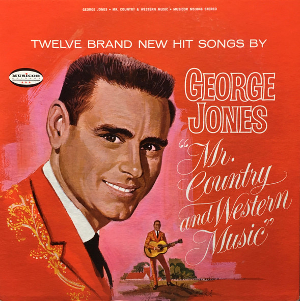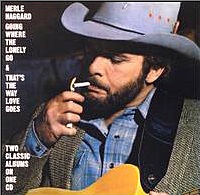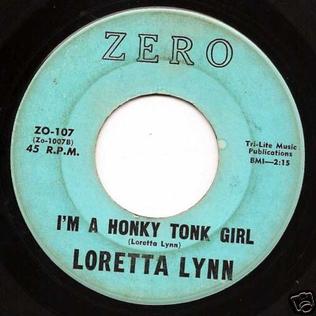
George Glenn Jones was an American country musician, singer, and songwriter. He achieved international fame for a long list of hit records, and is well known for his distinctive voice and phrasing. For the last two decades of his life, Jones was frequently referred to as "the greatest living country singer", "The Rolls-Royce of Country Music", and had more than 160 chart singles to his name from 1955 until his death in 2013.

John LaGale Horton was an American country, honky tonk and rockabilly musician during the 1950s. He is best known for a series of history-inspired narrative country saga songs that became international hits. His 1959 single "The Battle of New Orleans" was awarded the 1960 Grammy Award for Best Country & Western Recording. The song was awarded the Grammy Hall of Fame Award and in 2001 ranked No. 333 of the Recording Industry Association of America's "Songs of the Century". His first No. 1 country song was in 1959, "When It's Springtime in Alaska ".

Patty Loveless is an American country music singer. She began performing in her teenaged years before signing her first recording contract with MCA Records' Nashville division in 1985. While her first few releases were unsuccessful, she broke through by decade's end with a cover of George Jones's "If My Heart Had Windows". Loveless issued five albums on MCA before moving to Epic Records in 1993, where she released nine more albums. Four of her albums—Honky Tonk Angel, Only What I Feel, When Fallen Angels Fly, and The Trouble with the Truth—are certified platinum in the United States. Loveless has charted 44 singles on the Billboard Hot Country Songs charts, including five which reached number one: "Timber, I'm Falling in Love", "Chains", "Blame It on Your Heart", "You Can Feel Bad", and "Lonely Too Long".

Cold Hard Truth is the 56th studio album by American country music singer George Jones. The album was released on June 22, 1999, on the Asylum label.

One Woman Man is an album by American country music artist George Jones, released on February 28, 1989, on Epic Records.

Mark Nelson Chesnutt is an American country music singer and songwriter. Between 1990 and 1999, he had his greatest chart success recording for Universal Music Group Nashville's MCA and Decca branches, with a total of eight albums between those two labels. During this timespan, Chesnutt also charted twenty top-ten hits on the Billboard Hot Country Songs charts, of which eight reached number one: "Brother Jukebox", "I'll Think of Something", "It Sure Is Monday", "Almost Goodbye", "I Just Wanted You to Know", "Gonna Get a Life", "It's a Little Too Late", and a cover of Aerosmith's "I Don't Want to Miss a Thing". His first three albums for MCA along with a 1996 Greatest Hits package issued on Decca are all certified platinum by the Recording Industry Association of America (RIAA); 1994's What a Way to Live, also issued on Decca, is certified gold. After a self-titled album in 2002 on Columbia Records, Chesnutt has continued to record predominantly on independent labels.

Memories of Us is an album by American country music artist George Jones, released in 1975 on the Epic Records label. It peaked at #43 on the Billboard Country Albums chart. It is Jones’ 51st Album Release.

Mr. Country & Western Music is an album by American country music artist George Jones released in 1965 on the Musicor Records label.

My Favorites of Hank Williams is an album by American country music artist George Jones. It was released in 1962 on the United Artists record label. It was Jones' second tribute to the music of Hank Williams.

George Jones Salutes Hank Williams is the 1960 country music studio album released in May 1960 by George Jones. The album was the ninth studio LP release, and was recorded in one session. The album has been reissued multiple times since its release, including the tracks being reused on many compilations.

Grand Ole Opry's New Star is the debut studio album released by George Jones in November 1956 with Starday Records. Produced by Jones' manager Pappy Daily, the album was recorded during early sessions in 1954, throughout 1955, and other sessions in 1956. It is also the first album to be released on the Starday label, a label only four years old.
"Honky-Tonk Man" is a song co-written and recorded by American singer Johnny Horton. It was released in March 1956 as his debut single on Columbia Records, and the album of the same name reaching number 9 on the U.S. country singles charts. Horton re-released the song six years later, taking it to number 11 on the same chart.

Going Where the Lonely Go is the thirty-fifth studio album by American recording artist Merle Haggard backed by The Strangers, released in 1982.

"Why Baby Why" is a country music song co-written and originally recorded by George Jones. Released in late 1955 on Starday Records and produced by Starday co-founder and Jones' manager Pappy Daily, it peaked at 4 on the Billboard country charts that year. It was Jones' first chart single, following several unsuccessful singles released during the prior year on Starday. "Why Baby Why", has gone on to become a country standard, having been covered by many artists.

Live at the International, Las Vegas is a live album by Jerry Lee Lewis that was released on Mercury Records in 1970.
"Color of the Blues" is a 1958 country song written by George Jones and Lawton Williams and released by Jones on January 15, 1958.
"Don't Stop the Music" is a song written and recorded by George Jones. It was his first single release on Mercury-Starday and peaked at #10 on the country singles chart in early 1957.
"Out of Control" is a song by George Jones. It was released as a single on Mercury Records in 1960.
"I Just Don't Give a Damn" is a song co-written by American country singer George Jones. It was released as the B-side to his 1975 single "Memories of Us."

"I'm a Honky Tonk Girl" is the debut single by American country music artist Loretta Lynn, released in March 1960. The song was among the first to not only be recorded by Lynn, but also to be penned by her. She composed the song while living in Washington State, maintaining her role as a housewife and occasional member of a local country music band. The composition was later recorded in California after Lynn was given money by a local businessman, who was impressed by her singing. "I'm a Honky Tonk Girl" was then issued as a single under the newly founded and independent Zero Records label in March 1960.














